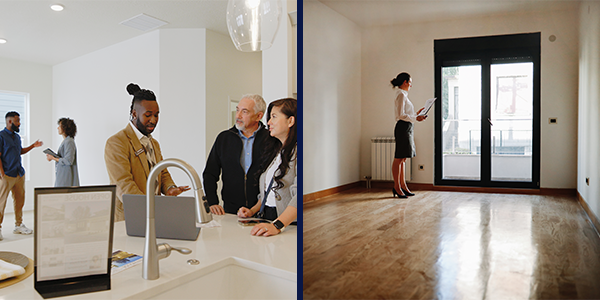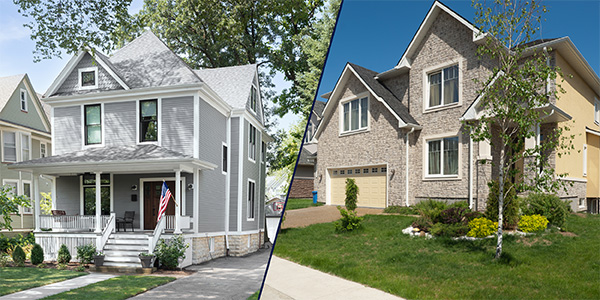Homebuyers
Using an FHA Loan to Buy a Foreclosure
May 30, 2023
Government-backed Federal Housing Administration (FHA) loans are available to those with low or non-existent cash reserves or credit score limitations. Foreclosures, not only homes for sale by owner, should be considered when looking for a house to buy since FHA loans also allow homebuyers to purchase properties in this category. This may enable potential homebuyers to discover the perfect house for them while paying a low mortgage amount.
With the recent FHA loan changes, now may be the best time to consider an FHA loan. Take the time now to learn more about the ways FHA loans can help you more easily acquire a home with the guide below.
Can FHA Loans be Used to Finance Foreclosures?
Yes, you can use your FHA loan to buy a house after foreclosure. Foreclosed homes are properties seized from previous owners when they have defaulted or broken the terms of the loan negotiated between the borrowers and the lender. Foreclosed homes usually sell below market value, making them an excellent choice for a typical homebuyer.
While buying a foreclosed home can potentially save buyers money, the standards and steps involved - such as the foreclosed home being in a livable state - may make the process more challenging than it first appears.
What are the Requirements for an FHA loan?
There are a handful of FHA requirements that borrowers will need to meet before the purchase of a foreclosed home can proceed. These requirements include:
Borrower Requirements:
- Credit Score/Status: Your credit score must be 580 or higher to qualify for an FHA loan. If the borrower has this score, they will be eligible for an FHA loan with a 3.5% down payment if all the FHA loan criteria are met. However, borrowers with credit scores as low as 500 can still receive FHA loans, but they may be required to pay an additional 10% down payment depending on the lender if the credit score does not improve.
- Ability to Repay: Borrowers must have the ability to repay the FHA loan's monthly payments. Lenders will ask that the borrower send in personal information like ID and proof that they have a stable job with a debt-to-income (DTI) ratio typically less than 45%, although the exact percentage may differ based on each borrower's unique financial situation.
- Down Payment: The down payment that every borrower will need to make to qualify for an FHA loan is at least 3.5%, but this may rise to 10% at the most depending on the credit status. Different down payment options exist to more easily pay for this amount, including having the required cash on hand, qualifying for a down payment assistance program, or receiving a gift of a down payment.
- Mortgage Insurance Payments: Borrowers must pay the upfront and monthly mortgage insurance premiums (MIP), and then they must continue paying the insurance payments for the life of the loan. Every borrower should use an FHA mortgage calculator to determine if applying for this loan type is right.
All lenders require their qualifications for approval.
Property Requirements:
- Primary Residence/Owner-Occupied: The property in question must be used as the borrower's primary residence. If the borrower already owns a home that they use as their primary residence, an FHA loan cannot be used for the borrower's new property. An FHA loan cannot be used for investing in properties like rental properties.
- Minimum Home Inspection Standards: The borrower must ensure that the property they're purchasing meets the minimum home inspection standards for both safety and habitability to qualify for the FHA loan. 'Fixer-upper' homes will usually not be approved for standard FHA loans. However, ‘fixer-upper homes’ may be allowed under the FHA 203(k) program. Talk to your Loan Officer to see if this may be a viable option for you.
- Appraisal: An FHA-approved appraiser must appraise the property so the lender may know that the property successfully meets the minimum FHA loan requirements and local building codes while establishing the home's fair market value.
Pros and Cons of Buying Foreclosures With an FHA Loan
Before deciding to go ahead with buying a foreclosure with an FHA loan, potential homebuyers, and borrowers should be aware of both the advantages and disadvantages of this process. The most important ones that every borrower should consider are outlined below.
Pros:
- Lower Down Payment: The smaller down payment needed to buy a foreclosure with an FHA loan can be as low as 3.5%, making it an incredibly attractive option for borrowers with poor credit.
- Easier Credit Requirements: The low credit score of 580 allows borrowers with a small or nonexistent credit score to qualify for an FHA mortgage that they may not have otherwise qualified for.
- Easier Qualifications: Borrowers looking to buy their first home or just starting may find FHA loans provide a real pathway to becoming a homeowner.
Cons:
- Property is sold as is: Foreclosed properties are sold in the exact condition that borrowers first view them. This means that the mortgage lender - the owner of the property - will not repair or otherwise fix the property in any way. The borrower will instead be the one responsible for performing any repairs, maintenance, or service to the property in addition to planned home remodels.
- The livability standard: All foreclosures must pass the FHA's livability standard in the form of an appraisal, ensuring that the home meets the Department of Housing and Urban Development's (HUD) minimum property standards.
- High competition: The lower price attached to foreclosed properties means that many others will also be looking to buy the home the borrower may be interested in. Most of the competing offers will be in the form of cash, making them more appealing to the lender than deals involving large amounts of financing (such as the case with FHA loans).
- Slow sales process: The long qualification process paired with the list of eligibility requirements makes successfully processing FHA loans a drawn-out endeavor from the application phase to the final closing.
Where Can I Find Foreclosures for Sale?
Purchasing a foreclosure with an FHA loan can be a great way to save money on a property that has the potential to become your home for many years or a great investment for the future. Foreclosed properties can be found on many sites offering real-estate listings and are also found in local newspapers, bank offices, and agencies. While the internet is a good informal resource to begin looking for foreclosed homes you can buy with an FHA loan, it pays to also look elsewhere to ensure that the perfect home for you is not overlooked.
An FHA Loan can Help you Buy a Foreclosure
When looking to buy a house after foreclosure, an FHA loan can be of significant help. However, every borrower must be aware of what exactly an FHA loan is, what the pros and cons of one are, and whether the loan itself - and the associated mortgage - is right for them.
For more questions about FHA loans, foreclosure, and other loan products, contact New American Funding. Our Loan Officers will be happy to help. You can also check out the current mortgage rates.






 Smart Moves Start Here.
Smart Moves Start Here.